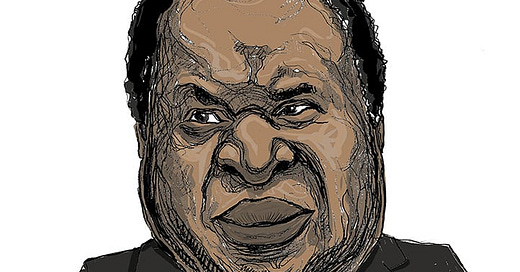‘The Guv’ who shaped South Africa’s economy
Tito Mboweni, 1959-2024, was the first black leader of the central bank.
Vernon Wessels
For a decade, everyone knew the drill on the Thursday afternoon when the South African Reserve Bank was to announce its decision on interest rates.
Tito Mboweni would stroll into the room, sporting a mischievous grin. Financial markets were on the edge of their seats – and he knew it. This was his show. The Governor, as he insisted on being known, would teach, preach, engage – and entertain – his captive audience. Mboweni, executives recall, could defuse the worst tensions with a well-timed joke, or announce a steep rate hike with a smile. For others, their memory is of the social media “chef”, who made canned pilchards famous, amusing his Twitter acolytes with his love of garlic and photos of himself sweating after too many chillies.
Mboweni, who had type-2 diabetes, died at Mediclinic Sandton Hospital in Bryanston last Saturday after returning from a trip to Ghana, according to a family friend. He was 65.
“He left an indelible mark on our country,” said Maria Ramos, chairperson of AngloGold Ashanti. She and her husband Trevor Manuel – South Africa’s f inance minister from 1996 to 2009 – became close friends with Mboweni after f irst meeting him in the 1980s.
Born in Tzaneen in Limpopo, Mboweni was active in the struggle against apartheid, which forced him into exile. Upon his return, he served as the deputy head of the ANC’s economic policy committee, helping to shape the party’s economic policy before it was voted into power in 1994. The new South Africa’s constitutional provisions outlining central bank independence also relied on Mboweni’s input.
In 1994, Mboweni was appointed labour minister under then president Nelson Mandela. He introduced laws that many businesses criticise for being too protective of workers’ rights, giving them the right to strike, and establishing labour courts that make it difficult to exploit workers.
Four years later, Mandela moved Mboweni to the Reserve Bank, where he became the central bank’s first black governor. Apartheid-era officials had left him with an almighty mess. Shortly before he’d joined, when the rand blew out in 1996 and 1998, the bank had tried in vain to defend the value of the rand by buying foreign currency and taking out forex contracts.
Mboweni not only had to close those contracts, but also rebuild the foreign exchange reserves – all at a time when many experienced hands chose to leave the Reserve Bank, many evidently not comfortable with a black governor.
But when the currency plunged in 2001, Mboweni didn’t make the same mistake. His adoption of inflationtargeting as the Reserve Bank’s mandate, and the fiscal management policies adopted by Manuel, built policy credibility and ensured that the rand recovered over subsequent years. Labour unions, however, objected to his use of interest rate hikes to tame inflation, believing this burdened families with higher costs, stymied growth and curbed job creation.
After a stint in the private sector from 2009 until 2018, Mboweni was appointed finance minister by President Cyril Ramaphosa. This had not been in Mboweni’s life plan. He had wanted to explore academia. But Ramaphosa had other ideas, calling on him as one of the very few with the stature needed to help clean up after the corruption-ridden years of Jacob Zuma.
Mboweni wasn’t afraid to court controversy, including openly disagreeing with the ANC, which had lobbied hard for the nationalisation of the Reserve Bank.
His quirks were many. Reporters attending the monetary policy committee press conferences were expected to wear ties and jackets; and even after he left the Reserve Bank, he still preferred to be called “Governor”. At one stage, he banned photographers because one had taken an unflattering picture of him wiping sweat from his brow under the searing lights.
He lived an open life on social media: frequent posts of his cooking, selfies after church, his 28-year-old shoes or photos of marijuana on his farm, where he anointed himself the “Duke of the Duchy of Magoebaskloof”, spoke of an atypical central banker. Those old shoes were belied by some of Mboweni’s finer indulgences, including red wine and whisky – fancies he’d curbed in the last few months of his life to focus on his health.
As Ramos puts it: “Some people work hard at being eccentric. Tito didn’t have to work that hard.”
What he did work hard at, however, was building South Africa’s economic policies. And on this score, while he may be gone, his fingerprints will linger for decades.




